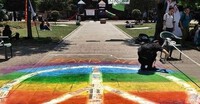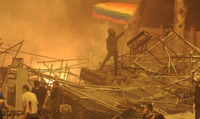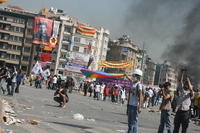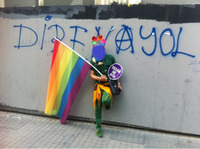LGBTI+
Even though the Ottoman Empire was one of the first countries in Europe to legalize homosexuality in 1858, queer sexual identities have remained oppressed to this day, especially by the more conservative parts of society. While Erdoğan had shown small amounts of support for the LGBTI+ community early in his career when he was trying to appear liberal, government policies have grown more and more discriminatory against queer people over the years. Two months before the Gezi protests began, Erdoğan said in a speech that gay couples were "immoral".
On May 29, while the first sparks of the Gezi movement were appearing, there was also a separate LGBTI+ protest action going on in the park. As the Gezi protests started and grew ever more comprehensive, the LGBTI+ protests naturally became a central part of them.
All images
-
 Peace sign on rainbow The photo from Gezi Park shows a white peace sign painted over the colors of the rainbow.
Peace sign on rainbow The photo from Gezi Park shows a white peace sign painted over the colors of the rainbow. -
 Demonstrator waving rainbow flag on barricade The photo depicts a demonstrator standing atop a makeshift barricade assembled by the protesters and waving a rainbow flag. The background is covered with smoke from a fire. Several other protesters can be seen behind the barricade in the lower left corner.
Demonstrator waving rainbow flag on barricade The photo depicts a demonstrator standing atop a makeshift barricade assembled by the protesters and waving a rainbow flag. The background is covered with smoke from a fire. Several other protesters can be seen behind the barricade in the lower left corner. -
 Protesters and various banners on the square The photo shows a large number of protesters in Taksim Square. There are various flags and banners in the background. Some of the more legible ones include: - A banner commemorating İbrahim Kaypakkaya, a former Maoist revolutionary who was hanged in 1973. The text reads "To remember Him is to fight!". - A banner on the right by the "Platform for the Unity of Struggles" saying "Welcome to the Red Square", referring to the Red Square in Moscow and the color red as a symbol of communism. - A big rainbow flag. - A purple banner stating "We don't owe children to anyone, neither to men nor to the state".
Protesters and various banners on the square The photo shows a large number of protesters in Taksim Square. There are various flags and banners in the background. Some of the more legible ones include: - A banner commemorating İbrahim Kaypakkaya, a former Maoist revolutionary who was hanged in 1973. The text reads "To remember Him is to fight!". - A banner on the right by the "Platform for the Unity of Struggles" saying "Welcome to the Red Square", referring to the Red Square in Moscow and the color red as a symbol of communism. - A big rainbow flag. - A purple banner stating "We don't owe children to anyone, neither to men nor to the state". -
 Person with rainbow flag in front of a queer graffiti The photo depicts a person in colorful clothing, who is holding a rainbow flag. They have a sign on them saying "What is with the ban ayol". "Ayol" is a Turkish filler word usually used by women, but often also by effeminate gay men and other feminine queer people. The graffiti on the wall similarly says "Resist ayol", with the letter "A" depicting the symbol of anarchism.
Person with rainbow flag in front of a queer graffiti The photo depicts a person in colorful clothing, who is holding a rainbow flag. They have a sign on them saying "What is with the ban ayol". "Ayol" is a Turkish filler word usually used by women, but often also by effeminate gay men and other feminine queer people. The graffiti on the wall similarly says "Resist ayol", with the letter "A" depicting the symbol of anarchism.



